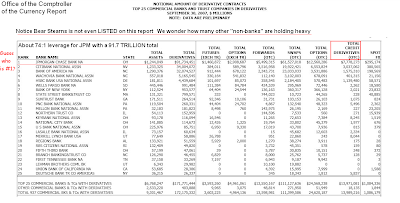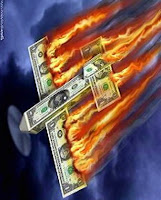
Countrywide Rating Cut to `Junk' By Standard & Poor's
By David Mildenberg
May 2 (Bloomberg) -- Countrywide Financial Corp.'s credit rating was unexpectedly cut below investment grade by Standard & Poor's Corp., which cited doubt about whether Bank of America Corp. will back the home lender's debt after they merge.
The revision reflects ``the new level of uncertainty as to the ultimate legal status of Countrywide's creditors'' after the lender's sale to Bank of America, Standard & Poor's said in a statement today. Prices on instruments that protect investors from a Countrywide default made their biggest jump in almost four months.
Bank of America, the second-largest U.S. bank by assets, agreed in January to buy Countrywide, the largest U.S. mortgage lender, for about $4 billion after speculation that Countrywide couldn't pay its debts and might go bankrupt. Bondholders have been counting on the merger to put Bank of America's AA credit rating behind Countrywide's $97.2 billion in debt.
``There is no assurance that any such debt would be redeemed, assumed or guaranteed,'' the Charlotte, North Carolina-based bank said in an April 30 regulatory filing, adding that no decision has been reached. Countrywide is based in Calabasas, California.
Just why is Bank of America buying Countrywide Financial, which is not only most likely insolvent, but carrying a huge amount of bad debt liabilities? Its an excellent question, and one which we highlighted early on back on January 11 of this year. Why is Bank of America Buying Countrywide Financial?
We bought up the usual suspicions, including a generous heaping of Fed pressure on BAC to consummate the deal, as CFC was clearly wobbly and most likely to fail after Bear Stearns.
We think that the pressure alone however would not have been enough to compel BAC to swallow something as ugly as CFC, even with a currency (BAC stock) that was likely inflated. And even with some big egos on the line, the ugliness that is the creation of Angelo M. is a significant pill to swallow, although we never like to attribute to complex motives when sheer arrogant stupidity might suffice.
We extended the hypothesis on March 14 in a story about the derivatives counterparty exposure which JPM had to Bear Stearns. If you look at the second chart in that story (reproduced below) you will see that BAC is number three on the derivatives over-leveraged hit parade. Bear Stearns: the Smoking Guns

And quite recently we put up a story about the losses at Countrywide, which are bad and getting rather ugly even by today's backstopped standards. Women and Children in Boats - Cannot Last Much Longer
Today we had the distinct pleasure of reading an analysis by one of our new and favorite commentators, Mr. Mortgage. His review of the CountryWide Financial acquisition by BAC is devastating, and sure to send a tingle up the spine of any BAC shareholder. BofA Getting Cold-Feet over Countrywide ‘Purchase’ - Too Many Toxins!
Mr. Mortgage gives BAC a piece of advice that had to occur to every swinging financial appendage in the market when the details of the JPM - Bear deal was disclosed. Ken Lewis had to feel a little shrunken at that point, with Jamie Dimon having achieved a deal with Ben that was significantly better by any standards based on the information at hand.
My advice is to BofA is to call Bernenke and say “the US can’t handle the largest mortgage servicer going down so you must back-stop $38.7 billion and we will back-stop $1 billion. If it was good enough for Chase and Bear, shouldn’t it be good enough for us? We were your first shill darn-it!”

Bloomberg has an interesting story today in which Bank of America suggests it might not provide any backing to Countrywide's debt as part of this acquisition. Nice legal trick if you can pull it off. This disclosure has caused Countrywide to be cut to 'junk' today by Standard & Poors.
May 2 (Bloomberg) -- Bank of America Corp., the second- biggest U.S. bank, said it may not guarantee $38.1 billion of Countrywide Financial Corp.'s debt after taking over the mortgage lender, increasing the likelihood of a default.
``There is no assurance that any such debt would be redeemed, assumed or guaranteed,'' the bank said in an April 30 regulatory filing, adding that no decision has been reached. Investors had grown more optimistic the bank would back Countrywide debt, and Standard & Poor's said this week it may raise Countrywide's rating to match Bank of America's.
Prices on instruments that protect investors from a Countrywide default made their biggest jump since March 10. Bank of America agreed in January to buy the largest U.S. mortgage lender for $4 billion amid speculation that the worst housing market since the Great Depression would bankrupt Countrywide. Bondholders are counting on the merger to put Bank of America's AA credit rating behind Countrywide's $97.2 billion of debt.
Countrywide's $1 billion of 6.25 percent notes due in 2016 fell 2.5 cents to 89.5 cents on the dollar at 12:24 p.m. in New York, according to Trace, the bond-price reporting system of the Financial Industry Regulatory Authority. The debt yields 8 percent, or 4.2 percentage points more than similar-maturity Treasuries, Trace data show. The debt fell to about half that price in January before Bank of America announced the purchase of Calabasas, California-based Countrywide.
We still think this whole deal hinges on Countrywide's debt assets, which are sure to be significantly impaired, similarly to that of Bear Stearns. As you see, the estimates of losses in the many tens of billions are far too much for BAC to just absorb, especially since the Fed has established the moral hazard precedent of stepping in and taking the big losses.
Let's keep an eye on this one. Nice trick if Bank of America can proceed with this acquisition and just keep the loan marketing and servicing infrastructure and repudiate the debt, either by default or wrapping it in a package for Bernanke's Fed, aka 'you' in another moral hazard milestone in socializing bank losses while privatizing their huge speculative profits.
 It appears that the line about 'Where are all the customer's yachts?' is to be shortened to 'Where are all the customers?'
It appears that the line about 'Where are all the customer's yachts?' is to be shortened to 'Where are all the customers?'
































